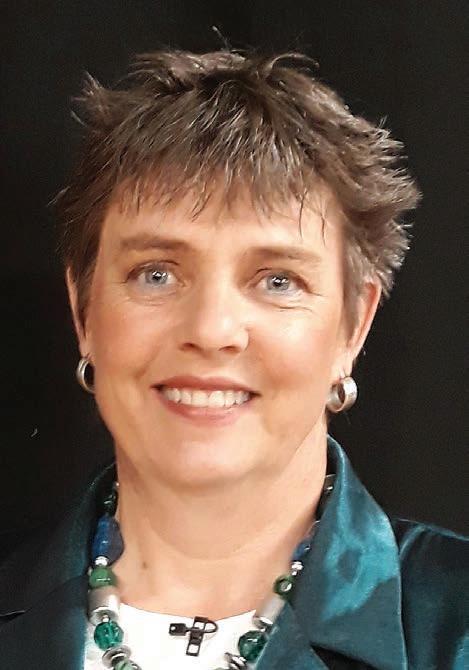
7 minute read
DairyNZ AGM
from Dairy Farmer November 2020
by AgriHQ
Negative perception of dairy misplaced
By Gerald Piddock
The perception that the media’s coverage of the dairy industry is wholly negative is not backed by statistics, DairyNZ chief executive Tim Mackle says.
It is an issue constantly raised by farmers during the organisation’s levy roadshows, Mackle told farmers at its annual meeting in Ashburton.
While not dismissing farmers’ feelings about the subject, DairyNZ’s monthly media analysis data showed it was not as bad as what people thought.
“It’s actually not as bad as what it feels like. The number of negative articles that come out every month is probably 6-7%. Everything else is either neutral or positive,” he says.
The issue of the industry’s image was raised by a farmer during general business at the meeting.
Mackle says public perceptions of dairying had swung upwards on the back of the covid-19 lockdown as people understood the importance of food production.
Mackle earlier said the Vision is Clear media campaign had led to 220,000 people visiting the campaign’s website.
He says it reached 500,000 people on social media every month and 70% of people who had seen the campaign said they felt more positively about the dairy industry compared to 59% who had not seen the campaign in DairyNZ’s most recent public perception survey.
“It is making a difference,” he says.
DairyNZ chairperson Jim van der Poel says it had been the subject of “robust discussions” around the board table.
“It’s always easier to get bad news out there than good news,” he says.
Van der Poel says it was an “absolute truth” that for members of the public who do not see or understand the good work many in the industry often felt the need to express that view at electiontime.
“And then of course you have governments that come in and feel they have a mandate to then follow through on that,” he says.
That was not to say the industry was perfect. It still had lots of work to do.
While the industry was trying to make that impact around changing people’s mindsets, it was probably not getting the cut-through it had hoped. The organisation was reviewing whether it was using its resources effectively, he says.
“Could we do better? Absolutely. And is this a collective industry issue? Absolutely,” he says.
Van der Poel says they will wait and see what the formation of the new government is before deciding on its strategy.
“Could we do better? Absolutely. And is this a collective industry issue? Absolutely.” Jim van der Poel
The organisation had spent the past three years building up relationships with key government people to make these people understand the implications of its policy particularly around freshwater on the dairy sector.
He says they have been told there were still opportunities to tweak those rules and DairyNZ will continue to work on that.
He also reflected on the 2019-20 year, calling it a busy and challenging year for the sector with the covid-19 pandemic.
“This also provided the opportunity to DairyNZ chief executive Tim Mackle says the perception that all media coverage of the dairy sector was negative did not match their analysis.
highlight the value and importance of our sector to New Zealand’s future,” he says. “Last year we made good progress towards Mycoplasma bovis eradication and in a world-leading emissions programme, He Waka Eke Noa, to collectively build a farm-level emission reduction framework. DairyNZ also advocated for pragmatic essential freshwater rules for farmers.”
Van der Poel and Colin Glass were both re-elected onto DairyNZ’s board.
The pair will be two of five farmerelected directors and three boardappointed directors who contribute to DairyNZ’s strategy and priorities on behalf of dairy farmers.
The results of several resolutions were also announced. These included the ratification of board-appointed directors Peter Schuyt and Mary-Anne Macleod, and a resolution on director remuneration.
Macleod replaced Dr Helen Anderson, who is stepping down from the DairyNZ board after 10 years.
“Helen has been a huge contributor to the board on your behalf. Helen brings that Wellington perspective to us and helps us to try and understand what drives Wellington and what makes it tick,” he says. n
RWNZ Category Award winners
Rural Women New Zealand (RWNZ), together with premier partner NZI, are pleased to announce the Category Award winners of the NZI Rural Women NZ
Business Awards 2020.
“The NZI Rural Women NZ Business
Awards provide an opportunity to celebrate and showcase excellence in business, entrepreneurship and innovation by rural women,” RWNZ national president Fiona Gower says.
“In deciding to hold the awards this year, we realised that there has never been a better time to recognise and support women who own and operate rural businesses.”
Executive manager of commercial underwriting Christina Chellew represented NZI as one of the judges on the panel.
“The judges were highly impressed with the calibre of entrants in this year’s awards, especially in the innovation and resilience each has shown against the background of covid-19,” Chellew says.
“It was extremely difficult to select our category winners as there were so many incredible entrants.”
In 2018, RWNZ refreshed its
Enterprising Rural Women Awards to become the NZI Rural Women
NZ Business Awards. By broadening the award categories, updating the application process and strengthening the judging criteria, RWNZ and NZI have ensured that the awards provide rural women business owners with an outstanding opportunity to showcase the diversity of their rural businesses.
Presentation of the awards to the Category winners and the announcement of the overall Supreme
Award winner will take place on
November 20 in Wellington.
The Award winners for each category are: – Creative Arts - Farmers Daughter
Design Studio - Rebecca Tosswill,
Wairarapa
Becks Tosswill owns and operates
Farmers Daughter Design Studio from a sheep and beef farm in the Wairarapa hill country. Farmers Daughter tells rural stories, and Becks is deeply committed to bringing her clients’ passion for their businesses to life through creative design and strategic thinking. – Emerging Business - Grass Roots Media; Chelsea Millar, Manawatu
Chelsea Millar is the Boss Lady and owner of Grass Roots Media. Chelsea and her team of four staff members draw on their rural roots to create and manage social media communications and campaigns for the food and fibre sector. They are hashtag Agvocates for the primary sector from the grassroots up. – Innovation - Purvis Feeds; Henrietta Purvis, North Otago
Henrietta Purvis and her husband Graeme came up with the idea of a lucerne chaff business due to their involvement with horses. Now, Purvis Feeds is recognised as a leading brand of animal feed and the first brand in New Zealand to infuse premium lucerne chaff with cold-pressed rapeseed oil to create a premium product. – Love of the Land - Higgins Shearing; Sarah Higgins, Marlborough
Sarah Higgins owns Higgins Shearing, which she operates in sunny Marlborough. In an industry where there are stereotypes of what shearers look like and behave, Sarah and her team are a breath of fresh air. Their passion for their work and commitment to producing quality results while having fun doing it is what makes Sarah’s brand stand out. As a competitive and world record holding shearer herself, Sarah encourages her team to develop their skills by participating in shearing and woolhandling competitions. – Rural Champion - SMW Design & Events; Sue Wilson, Wairoa
Sue Wilson has been a champion for her rural community for decades, much of it as a dedicated volunteer who embraces new projects and knows how to turn community dreams into reality. Rural Women New Zealand national president Fiona Gower says the awards celebrate excellence in business, entrepreneurship and innovation by rural women.

SMW Design & Events grew out of Sue’s passion for her community and “piece of paradise” in Wairoa. – Bountiful Table - The Baked Dane; Lisa Brink, Horowhenua
Lisa Brink’s business, The Baked Dane, creates Scandinavian-inspired baked goods that are almost impossible to resist. Lisa draws her inspiration from her childhood in Denmark where she was surrounded by family and people who loved working with food. – Rural Health and Wellness Excellence - Kate Ivey Fitness; Kate Ivey, Mackenzie District
Kate Ivey’s business was born out of her own struggle to consistently live a healthy lifestyle, despite having qualifications and extensive experience in the health and fitness industry.
After the birth of her third child, Kate finally realised that she knew exactly what to do to look after herself, as well as being a mother and wife. n










